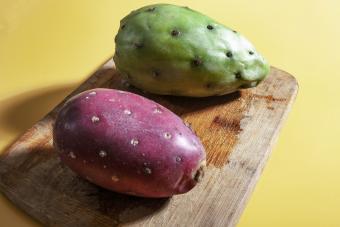
LoveToKnow recently interviewed Pamela Riemenschneider from Fruit and Veggie Guru.com about selecting produce from your local farmers market. She provided us with the following information to help you select the best organic produce at your farmers market this summer. Whether you're buying asparagus or watermelon, these tips will help you select and prepare healthy food for your family.
How do you know if organic foods sold at a local farmers market really are organic?
This can be a tough one to answer. Small farmers, with sales of less than $5,000, are exempt from the USDA's National Organic Program standards so you'll often have to take their word for it. The best thing to do is to ask them about their growing philosophy. The only sure bet is if they are certified organic by a third-party firm and they should be able to provide you a name of the certifying agency so you can call and check to make sure they are up-to-date on their paperwork and procedures. They are not allowed to use the USDA Organic logo unless they have been certified organic.
Will organic produce purchased at farmers markets look different from commercially grown produce?
Ten years ago, there might have been a very noticeable difference between organic and conventional produce. It was often smaller, scarred or buggy.
Nowadays, farmers have gotten a lot better at pest management, appropriate, organic-friendly fertilizers and maintaining the cold chain from field to market. Consequently, produce looks very similar to its conventional counterpart.
It all depends on the size and sophistication of the farmer. Some crops don't look too great because maybe they weren't treated very well in the handling/harvesting process while others are pristine because they're taken better care of. That can be true whether you're talking conventional or organic.
Is organically grown produce more flavorful than commercially grown produce?
I don't know if this statement can be completely accurate either way. It depends on what you mean when you say "commercially grown". A lot of organic produce people find in the supermarket is commercially grown. I think a better distinction could be made between what is "commercially grown" and what is "home grown". Commercially grown produce, whether conventional or organic, is grown for maximum yield, durability and shelf-life, and flavor sometimes takes a back seat.
"Home-grown" produce usually doesn't have to make the trip across country in a refrigerated truck and is grown on a smaller scale than the commercial operations.
Think of it this way: A tomato bought in your local grocer probably isn't going to taste like one bought at a farm stand or grown at home because it was picked green and ripened in a warehouse. That tomato you grew at home (or bought at a farm stand) was picked when it was at the peak of ripeness and tastes great. It, however, wouldn't be commercially viable at the supermarket because it wouldn't hold up to the handling and transportation required to get it there.
Conventional versus organic, when it comes to flavor comparisons, is usually subjective. There have been some studies of the individual flavor components of a certain fruit or vegetable to measure whether there is more present in an organic piece of fruit versus conventional, but most have been inconclusive.
A lot of it comes down to variety - some seeds produce a more flavorful product than others.
Do you still need to wash fresh produce from a local farmers market if it is organic?
Yes! You don't know who touched what when that produce was grown, picked, packed or transported from farm to market - or who touched it while it was on display before you got to it. It's not just a pesticide issue, but could also be a fertilizer issue or even something to do with wildlife walking through a field when the farmer wasn't looking.
You should wash everything - including melons. A lot of people don't think of washing things like melons because you don't eat the outer skin. However, when you cut into a melon, whatever was on the outside of that skin goes right in with the knife.
Will organic produce "go bad" more quickly than commercially grown produce?
Non-commerically-grown produce - just about anything grown at home or bought at a farmers market - will likely go bad quicker than something you buy at the supermarket. That's because it's picked at the peak of ripeness rather than picked a few days ahead of time and transported across country in a refrigerated trailer and then displayed in a refrigerated environment. There's no secret ingredient in conventional growing that makes produce last longer than organic produce.
Should I worry about e. coli from organically grown produce?
Foodborne pathogens, like E. coli or salmonella, can be found in any type of produce but should not be a deterrent. Always wash everything thoroughly and make sure you don't have any kitchen contamination. The majority of foodborne illnesses originate in the home from improperly cleaned surfaces and utensils.
How can I tell if the produce is fresh?
- Ask the farmer when it was picked.
- Look for signs that it may not be up-to-snuff like dents, scars, wilts or brown spots.
- Smell. Your nose usually won't lead you astray. If you're at the farmers market picking out produce, you shouldn't get any hint of that "rotten fruit" smell from whatever you're buying. You should get a fresh, earthy aroma from just about anything.
About Pamela Riemenschneider
Pamela Riemenschneider has been involved with the fruit and vegetable industry for the past four years, most recently with Vance Publishing's fresh produce division, including The Packer, the fresh produce industry's leading trade publication. She spends most of her day talking to growers, shippers and marketers and travels extensively to the different growing regions to get a first-person look at the various methods of growing, picking, packing and transporting fruits and vegetables from farm to market.







